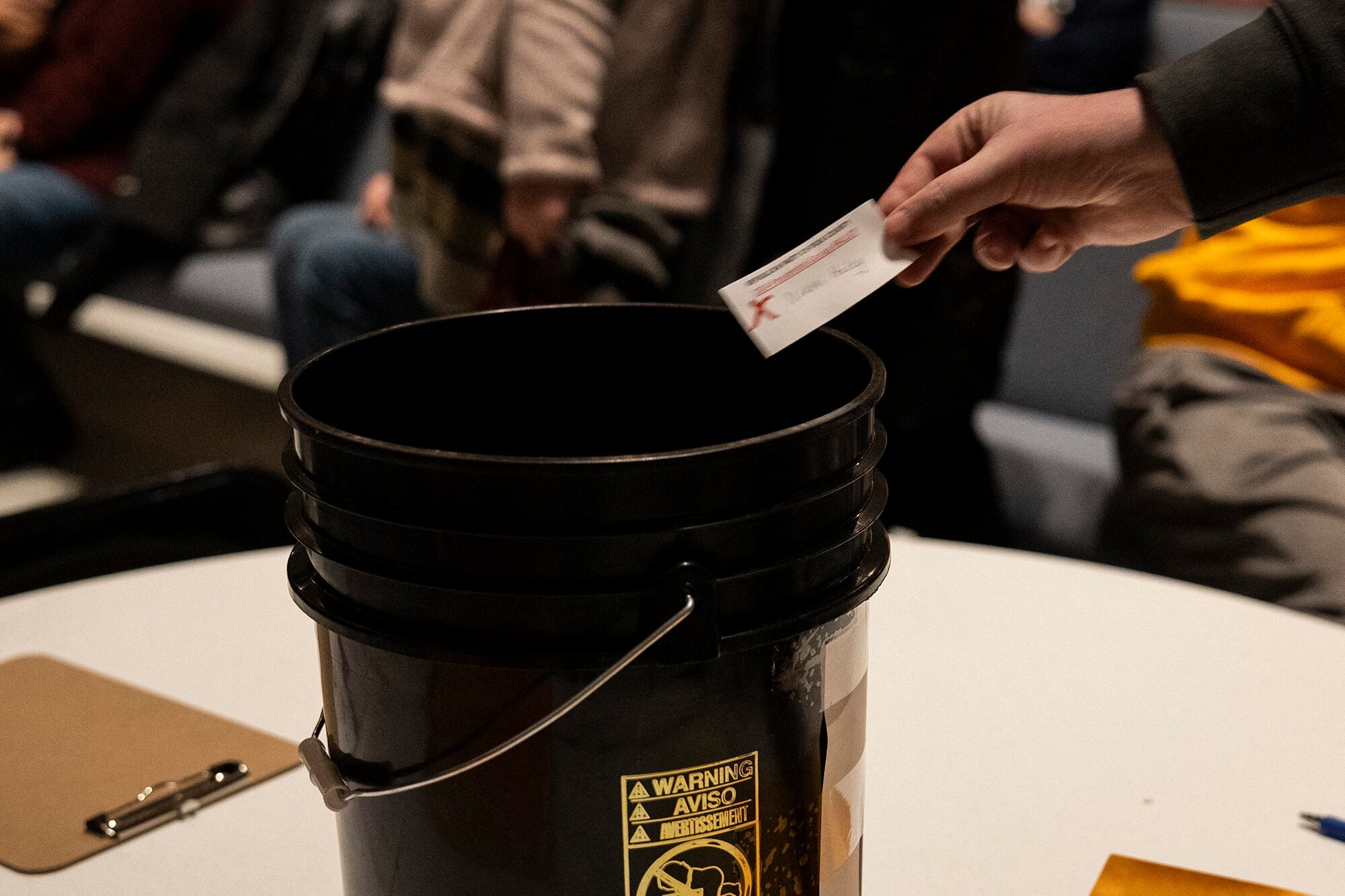Votebeat is a nonprofit news organization reporting on voting access and election administration across the U.S. A version of this post was originally distributed in Votebeat’s free weekly newsletter. Sign up to get future editions, including the latest reporting from Votebeat bureaus and curated news from other publications, delivered to your inbox every Saturday.
Good morning,
Reams of ink have been spilled on the clearest takeaway from the Iowa Caucus. Here’s one: Polls of caucusgoers found that around two-thirds didn’t believe President Joe Biden legitimately won the 2020 election, and most of those respondents supported former President Donald Trump.
Now, many people have pointed out that the group of people voting in the Iowa caucuses is hardly a representative one — nor is the process (somehow, popcorn buckets are involved). And this year’s caucuses, held in bone-chilling, life-endangering cold, had 110,000 voters, or roughly 15% of the state’s registered Republicans — the lowest turnout in more than a decade, CBS News reported.
Still, more than three years after the 2020 election, that poll had a striking result. But anyone paying attention shouldn’t be startled.
This poll’s result echoed many others since the 2020 election that have found a significant number of Republicans don’t believe Biden won fairly. Of course, most Americans do believe Biden won fairly (and have since the election), and there’s no evidence he didn’t. Nonetheless, as the Iowa poll results reinforce, this country is going into the 2024 election with the most committed supporters of one of the two major political parties still buying into a false narrative of election fraud.
That’s despite the fact that, since the 2020 election, there have been untold numbers of attempts to prove election fraud, and they’ve all come up short. Judges have weighed such claims in courts of law and found them wanting. A bonkers review of votes in Maricopa County, Arizona pushed by Trump supporters got pretty wacky, but nonetheless found Biden won Maricopa County. The fraud claims have been picked apart by experts who said they were unfounded, including experts hired by the Trump campaign, and vigorously combated by election officials from both political parties — including many who would have liked to see Trump win. Trump supporters who spread such claims have pled guilty to criminal charges in connection with their efforts, and been found liable in civil defamation cases. Fox News agreed to pay nearly $800 million to voting machine company Dominion Voting Systems after reporting demonstrably false claims about its machines.
On top of that, reporters have searched for any evidence of fraud and, in the process, debunked countless claims. It’s hard to think of claims that have been more thoroughly debunked.
Still, the belief that the 2020 election was unfair or rigged persists. It takes varied forms, almost like an evolving virus. Ask people what they mean when they say the 2020 election wasn’t legitimate, and they all say something different. Some people say pandemic-prompted changes to election laws and rules didn’t go through state legislatures, and so the election wasn’t legitimate. (The Supreme Court last year rejected an extreme version of this so-called independent state legislature theory, but that hasn’t ended this push.) Others repeat debunked apocryphal tales about dead voters and fraud. And West Virginia Secretary of State Mac Warner, who is running for U.S. Senate, responded “yes” to a question in December about whether the election was stolen because, he said in a press release, the way federal intelligence discredited scandalous claims centered on the former laptop of Biden’s son Hunter meant “the 2020 presidential election was improperly influenced by federal officials.”
So what’s the takeaway here, especially for a newsroom dedicated to covering elections and voting access in this climate of mistrust?
In 2024, reporters need to make sure they pin down exactly what people mean when they make sweeping claims about elections and illegal voting. We must strive to use specific language to describe exactly what people are claiming when they invoke loaded terms like “ballot harvesting” and must contextualize the claim clearly, saying both what we know to be true and what we don’t know yet.
And we must continue to explore not just why so many people believe their elections are illegitimate, but the consequences of that belief as the country moves toward the presidential election. After all, state lawmakers are passing legislation rooted in conspiracy theories and disproven allegations, as well as new laws meant to convince people elections are sound. Journalists are responsible for questioning the rationales behind such laws and reporting on whether they’re working as intended or having a disparate effect on some voters.
In the meantime, I’d love to have your thoughts. What’s continuing to drive these beliefs? What do people mean when they say the 2020 election wasn’t fair? What are the potential consequences for 2024?
Carrie Levine is Votebeat’s story editor and is based in Washington, D.C. She edits and frequently writes Votebeat’s national newsletter. Contact Carrie at clevine@votebeat.org.






